Redditor Recommends Earplugs and Sleepy Time Podcasts to Neighbor Who Complains of His Dogs Barking
Nobody should ever think that a dog would never bark. That would be absurd, like expecting a toddler to never speak.
However, some dogs bark unnecessarily. Finding out what makes your dog bark excessively is the first step to solving the issue if it exists in your home.
You can only start addressing their barking issues after you understand why they are barking. Even the most devoted dog lovers among us become annoyed when their neighbor's dog barks nonstop.
The incessant barking might make it difficult to sleep, ruin your time outside, and generally be a nuisance. You understand that your neighbor's dog's barking is causing you to lose focus, but what can you do?
Well, talking to your neighbors should be your first step. They might not even be aware of the barking if they are away from the house all day.
Alternatively, they might already be addressing the issue, assuming they are aware of it. So it’s best to meet your neighbors in person, in a nice and respectful manner, while letting them know that the barking is starting to bother you and your family.
Just describe the issue and give them an opportunity to respond; don’t assume or accuse, as they may be inexperienced dog owners. This is exactly what the OP’s neighbor did, but he received backlash instead.
This Redditor has asked the neighbor to try different options rather than training the dogs

You don’t see him asking the sun to not shine

Redditors wasted no time in criticizing the OP, as they were of the opinion that the dogs needed to be trained. In fact, the OP was thoroughly roasted in the comments, and here are some of them below...
1. They are barking most of the time

Understanding Neighborly Conflicts
Neighbor disputes often arise from misunderstandings and differing expectations regarding shared spaces. Social psychologists emphasize that effective communication plays a critical role in resolving such conflicts. A study published in the Journal of Community Psychology found that neighbors who openly communicate their needs and boundaries experience fewer conflicts overall.
This finding suggests that proactive dialogue can prevent misunderstandings from escalating into larger disputes, fostering a more harmonious living environment.
2. You should not be leaving your dogs outside

3. Your dog's incessant barking is your fault

4. It's hard to ignore dogs barking

The neighbor's complaint about barking dogs reflects a common issue in shared living environments. Research indicates that noise sensitivity can have significant psychological effects, including increased stress and anxiety. According to the American Psychological Association, prolonged exposure to noise can lead to heightened irritability and negatively impact sleep quality, further aggravating interpersonal conflicts.
Being aware of these effects can help individuals approach such situations with empathy and understanding.
5. You are not being a good neighbor

6. Teach your dogs to be quiet

7. You're too lazy to take care of your dogs

Effective Communication Strategies for Conflict Resolution
To address noise-related concerns, employing effective communication strategies is essential. Experts recommend using 'I' statements to express feelings without placing blame, such as 'I feel anxious when the barking interrupts my work.' This approach fosters a more constructive dialogue, allowing both parties to work toward a solution.
Additionally, scheduling a time to discuss the issue when both parties are calm can lead to more productive conversations, ultimately minimizing conflict and fostering neighborly goodwill.
8. Train your dogs, OP

9. Why do you even have the dogs?

10. Where you, as the owner, step in...
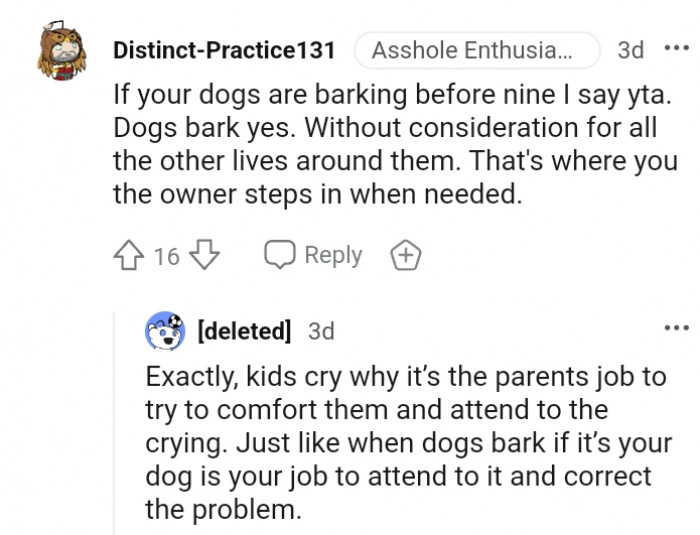
Moreover, exploring compromise solutions can be beneficial for both parties. For instance, the dog owner might consider creating a designated quiet time or utilizing training techniques to reduce barking, while the neighbor could agree to be more understanding during specific hours. Research shows that collaborative problem-solving can lead to more satisfactory outcomes in conflict resolution, strengthening relationships within the community.
Engaging in neighborly activities, such as hosting a casual gathering, can also help build rapport and understanding, making it easier to address issues when they arise.
11. Most areas have specific laws on record
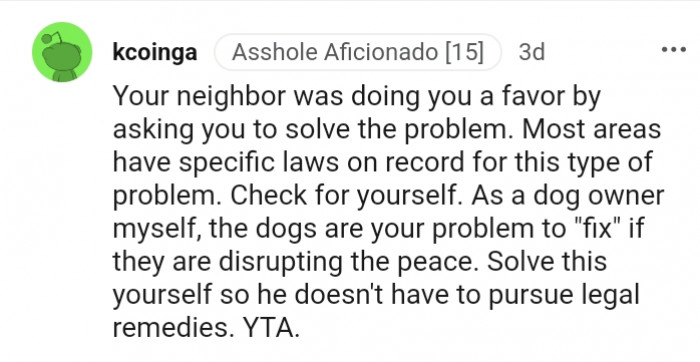
12. The only helpful thing you could have done
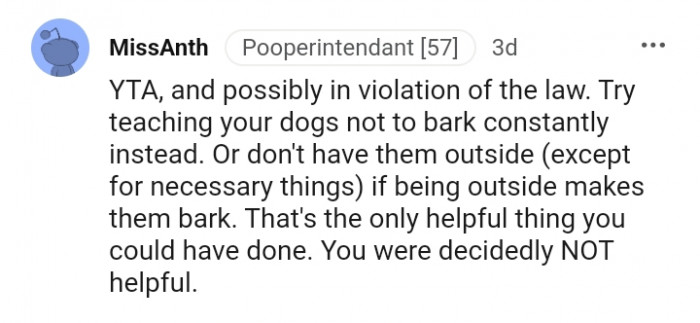
13. You have to train and manage your dogs
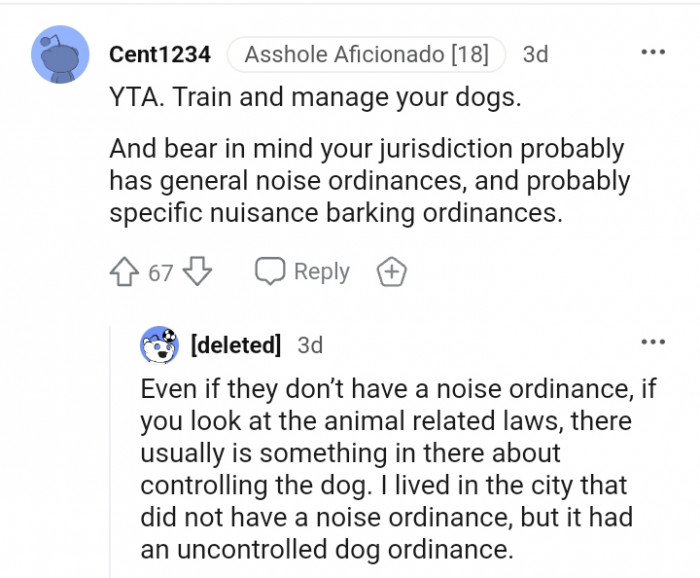
14. This Redditor says it all

15. A lousy, aggressively intrusive neighbor

16. Sounds like they bark constantly

17. Don't just let your dogs keep barking
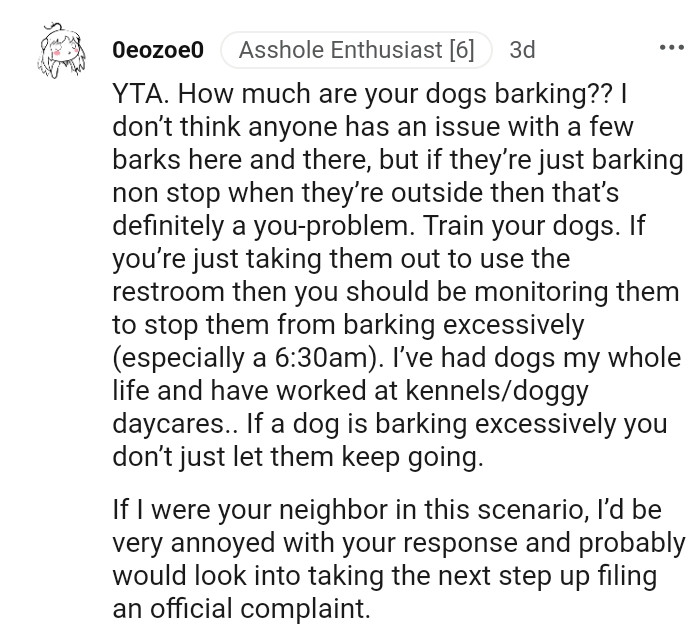
18. This Redditor has an interesting story to share
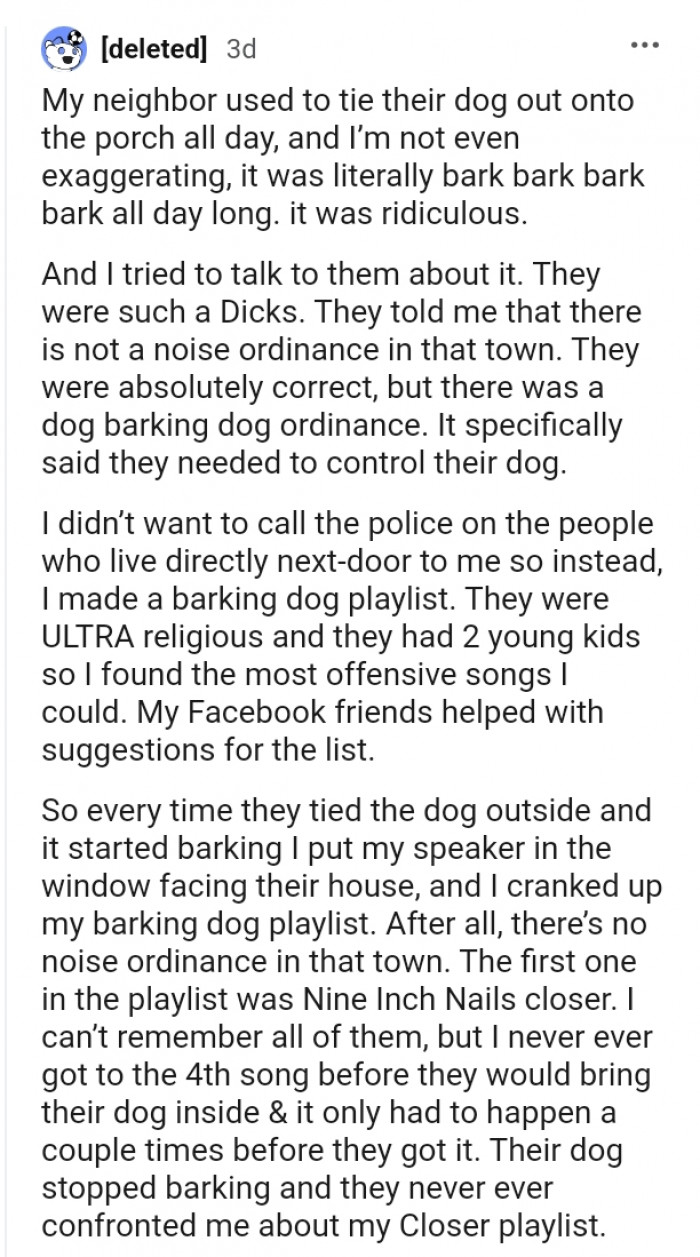
19. This Redditor needs additional info

20. This Redditor is pitying the OP's neighbors

The OP added an update in the comments later on, and here it is...
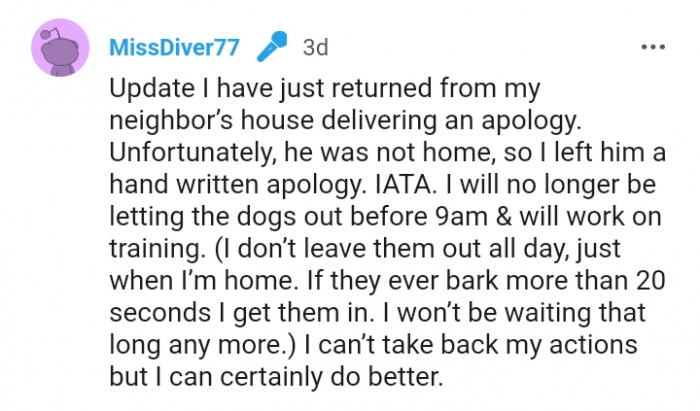
No one wants to deal with a dog that barks consistently, and it’s even worse when the dog owner doesn’t care. The OP has been put in their place for behaving in such an entitled manner, and we love to see it.
What are your thoughts about this story? Share them with us by leaving a comment below.
Psychological Analysis
This situation reflects how easily misunderstandings can escalate into conflicts, particularly when communication is lacking. It's essential for both parties to approach the issue with empathy, recognizing that each individual has their own set of challenges. By fostering open dialogue and seeking compromises, neighbors can work together to create a more pleasant living environment.
Analysis generated by AI
Analysis & Alternative Approaches
Ultimately, resolving neighbor disputes requires patience, understanding, and effective communication. As Dr. Adam Grant, an organizational psychologist, emphasizes, "The key to resolving conflicts is to focus on the interests behind the positions." Early intervention is crucial to prevent escalation, as noted on his professional website adamgrant.net. Additionally, fostering positive relationships with neighbors can lead to a more supportive and harmonious community, a sentiment echoed by Dr. Terri Orbuch, a relationship researcher, who states, "Healthy relationships are built on open communication and mutual respect," which can be found on her site terriorbuch.com.



